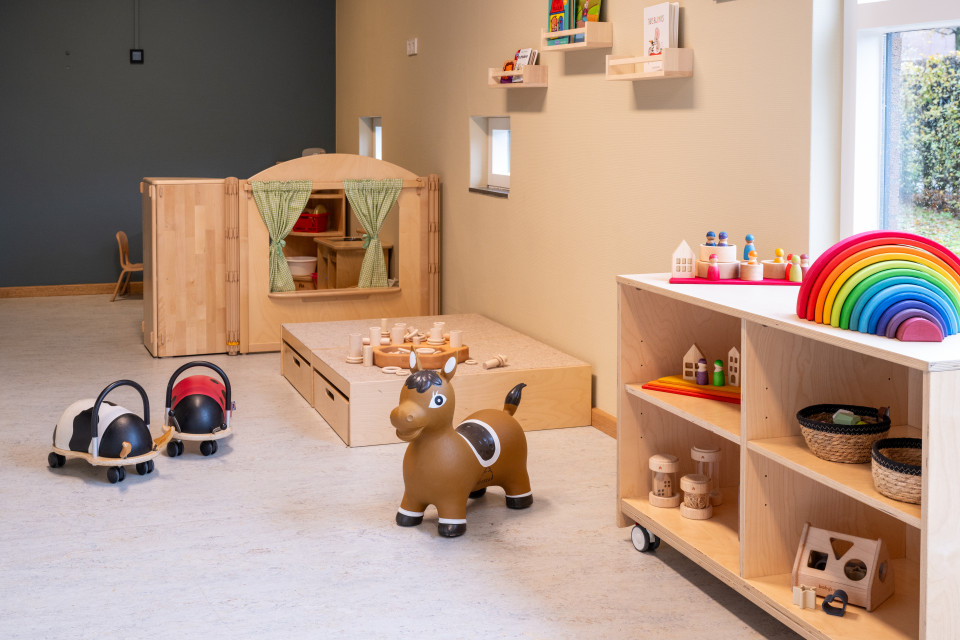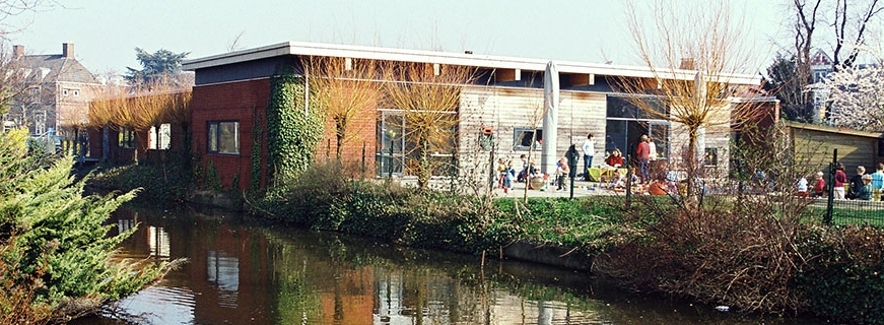
A village on campus: De Kattekop nursery run by psychologist Ellen Buschman
Parents from all corners of the university bring their children to De Kattekop, the university’s day nursery. De Kattekop is celebrating its 45th anniversary, and Ellen Buschman is at the helm. How does she use her psychology degree in her work?
It’s a heart-warming sight in the wooden De Kattekop building on Wassenaarseweg: fluffy yellow chicks run around a large clear container, animated toddlers chat at the table and babies snooze in the baby room. Director Ellen Buschman once attended psychology lectures in the faculty building just metres from the creche. A few twists and turns later, this Leiden graduate is now the director of De Kattekop, where she applies the theory from her degree to the practice of a nursery.

Why made you decide to study psychology?
‘I was always interested in the human psyche, in what drives people. I first wanted to be a paediatrician but hadn’t taken the right science subjects, so I opted for psychology instead, specialising in organisational psychology and developmental psychology because I wanted to learn more about child development. After graduating, I found a job as a school psychologist, but mainly had contact with children and parents when their families were already troubled. That made me even more aware of how important it is for children to get off to a good start in life, and is one of the reasons why I moved to childcare.’
Why are the early years so important?
‘The 0-to-6 stage is the crucial phase in which children learn to develop secure attachments. A good start in life promotes their development, which is why we create a really safe environment here, both physically and emotionally. We are really conscious of providing stability and a good atmosphere. That atmosphere and its compact size are the charm of De Kattekop. We’ve got two baby groups and two toddler and pre-schooler groups, and luckily, little in the way of staff attrition. Parents tell us it feels like a safe haven for them too. Many parents already know one another through their work, making it feel a bit like a village here.’
-

-

De Kattekop day nursery on Wassenaarsweg
Where do the parents come from?
‘The parents are very diverse: students, academics and other staff – and many are from an international background. We recently had a parents’ evening about multilingual parenting, and the parents there represented 14 languages! It’s often international within single families. Then, for example, dad is Italian and mum French, and they speak English together, while the child learns Dutch here. Our staff are extra aware that our children do not all speak Dutch at home. Luckily, children tend to be very flexible and soon pick up the language.’
What else is typical of a university creche?
‘My pedagogical coach and I recently visited the Faculty of Social and Behavioural Sciences, where, like me, she also studied. That was how the idea arose of doing more with the fact that we belong to a university. For example, by working on a pilot connecting the theory and the practice of new pedagogical insights. Bringing those worlds together is inspiring.’
‘Children live in the here and now, without all those to-do lists adults constantly have in their heads’
You’ve been the director here for four years. What are the challenges?
‘I have to keep lots of balls in the air: from managing the team and updating the pedagogical policy to practical things like getting the fence adapted. My degree definitely comes in useful because management is all about psychology: what motivates staff, how everyone can develop and what makes a good working environment. Self-awareness and knowing your limitations are also important when leading a team. Alongside psychology, I later did a business degree because managing an organisation is a discipline in its own right.’
Are there things that you learn from the children?
‘Children live in the here and now, without all those to-do lists adults constantly have in their heads. I always do a round in the morning, and the toddlers are chatting away, marvelling at things, or are simply delighted with something like a new pair of shoes. I really enjoy that.’
